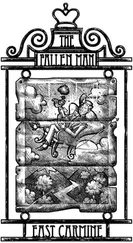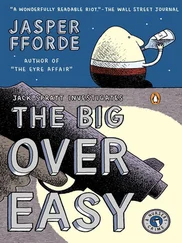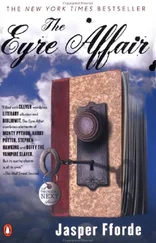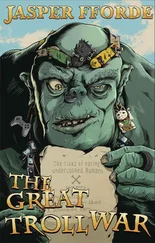‘What is your name, child?’ she asked sternly.
‘Thursday Next, ma’am.’
‘Ah!’ she said again. ‘The Next girl. Took you long enough to find your way in here, didn’t it?’
‘Sorry?’
‘ Never be sorry, girl—it’s a waste of time, believe me. If only you had seriously attempted to come to Jurisfiction after Mrs Nakajima showed you how up at Haworth… well, I’m wasting my breath, I can see.’
‘I had no idea!’
‘I don’t often take apprentices,’ she carried on, disregarding me completely, ‘but they were going to allocate you to the Red Queen. The Red Queen and I don’t get along. I suppose you’ve heard that?’
‘No, I’ve—’
‘Half of all she says is nonsense and the other half is irrelevant. Mrs Nakajima recommended you most highly but she has been wrong before; cause any trouble and I’ll bounce you out of Jurisfiction quicker than you can say ketchup. How are you at tying shoelaces?’
So I tied Miss Havisham’s trainers for her, there in Satis House among the rotted trappings of her abandoned marriage. If you had told me I would be doing this even an hour previously I would have considered you insane.
‘There are three simple rules if you want to stay with me,’ began Miss Havisham in the sort of voice that brooks no argument. ‘Rule One—you do exactly as I tell you. Rule Two—you don’t patronise me with your pity. I have no desire to be helped in any way. What I do to myself and others is my business and my business alone. Do you understand?’
‘Yes, ma’am. What about Rule Three?’
‘All in good time. I shall call you Thursday and you may call me Miss Havisham when we are together; in company I shall expect you to call me “ma’am”. I may summon you at any time and you will come running. Only funerals, childbirth or Vivaldi concerts take precedence. Is that clear?’
‘Yes, Miss Havisham.’
I stood up and she thrust a candle up to my face and regarded me closely. It allowed me a close look at her too. Despite her pallid demeanour, her eyes sparkled brightly and she was not nearly as old as I supposed—all she needed was a fortnight of good meals and some fresh air. I was tempted to say something to enliven the dismal surroundings but her iron personality stopped me, I felt as though I were facing my teacher at school for the first time.
‘Intelligent eyes,’ muttered Havisham, ‘committed and honest. Quite, quite sickeningly self-righteous. Are you married?’
‘Yes,’ I mumbled, ‘that is to say—no.’
‘Come, come!’ said Havisham angrily. ‘It is a simple enough question.’
‘I was married,’ I answered.
‘Died?’
‘No,’ I mumbled, ‘that is to say—yes.’
‘I’ll try harder questions in future,’ announced Havisham, ‘for you are obviously not adept at the easy ones. Have you met the Jurisfiction staff?’
‘I’ve met Mr Snell—and the Cheshire cat.’
‘As useless as each other,’ she announced shortly. ‘Everyone at Jurisfiction is either a charlatan or an imbecile—except the Red Queen, who is both. We’ll go to Norland Park and meet them all, I suppose.’
‘Norland? Jane Austen? The house of the Dashwoods? Sense and Sensibility ?’
But Havisham had moved on. She held my wrist to look at my watch, took me by the elbow and, before I knew what had happened, we had joggled out of Satis House to the library. Before I could recover from this sudden change of surroundings, Miss Havisham was reading from a book she had drawn from a shelf. There was another strange joggle and we were in a small kitchen parlour somewhere.
‘What was that?’ I asked in slight alarm, I wasn’t yet used to the sudden move from book to book but Havisham, well accustomed to such manoeuvres, thought little of it.
‘That,’ replied Miss Havisham, ‘was a standard book-to-book transfer. When you’re jumping solo you can sometimes make it through without going to the library—so much the better; the cat’s banal musings can make one’s head ache. But since I am taking you with me, a short visit is sadly necessary. We’re now in the back-story of Kafka’s The Trial. Next door is Josef K’s hearing, you’re up after him.’
‘Oh,’ I remarked, ‘is that all.’
Miss Havisham missed the sarcasm, which was probably just as well, and I looked around. The room was sparsely furnished, a washing tub sat in the middle and next door, from the sound of it at least, a political meeting seemed to be in progress. A woman entered from the courtroom, smoothed her skirts, curtsied and returned to her washing.
‘Good morning, Miss Havisham,’ she said politely.
‘Good morning, Esther,’ replied Miss Havisham. ‘I brought you something.’ She handed her a box of Pontefract cakes and then asked: ‘Are we on time?’
There was a roar of laughter from behind the door, which quickly subsided into excited talking.
‘Won’t be long,’ replied the washerwoman. ‘Snell and Hopkins have already gone in. Would you like to take a seat?’
Miss Havisham sat, but I remained standing.
‘I hope Snell knows what he’s doing,’ muttered Havisham darkly. ‘The examining magistrate is something of an unknown quantity.’
The applause and laughter suddenly dropped to silence in the room next door, and we heard the door handle grasped. Behind the door a deep voice said:
‘I only wanted to point out to you, since you may not have realised it yet, that today you have thrown away all the advantage that a hearing affords an arrested man in every case.’
I looked at Havisham with some consternation but she shook her head, as though to tell me not to worry.
‘You scoundrels!’ shouted a second voice, still from behind the door. ‘You can keep all your hearings!’
The door opened and a young man with a red face, dressed in a dark suit, ran out, fairly shaking with rage. As he left the man who had spoken—I assumed this to be the examining magistrate—shook his head sadly and the courtroom started to chatter about Josef K’s outburst. The magistrate, a small, fat man who breathed heavily, looked at me and said.
‘Thursday N?’
‘Yes, sir?’
‘You’re late.’
And he shut the door.
‘Don’t worry,’ said Miss Havisham kindly, ‘he always says that. It’s to make you ill at ease.’
‘It works. Aren’t you coming in with me?’
She shook her head and placed her hand on mine.
‘Have you read The Trial ?’
I nodded.
‘Then you will know what to expect. Good luck, my dear.’
I thanked her, grasped the door handle and, with heavily beating heart, entered.
18. The Trial of Fräulein N
‘ The Trial, Franz Kafka’s masterpiece of enigmatic bureaucratic paranoia, was unpublished in the writer’s lifetime. Indeed, Kafka lived out his short life in relative obscurity as an insurance clerk and bequeathed his manuscripts to his best friend on the understanding that they would be destroyed. How many other great writers, one wonders, penned masterworks which actually weredestroyed upon their death? For the answer, you will have to look in among the sub-basements of the Great Library, twenty-six floors of unpublished manuscripts. Amongst a lot of self-indulgent rubbish and valiant yet failed attempts at prose you will find works of pure genius. For the greatest non-work of non-non-fiction, go to Sub-basement 13, Category MCML, Shelf 2919/812, where a rare and wonderful treat awaits you— Bunyan’s Boot-scraperby John McSquurd. But be warned. No trip to the Well of Lost Plots should be undertaken alone…’
Читать дальше












